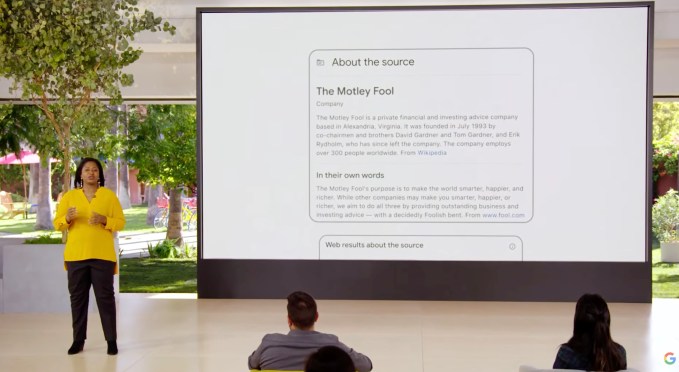Google is making a change to its search results with the goal of improving the media literacy of online users. The company is expanding the capabilities of its “About this Result” feature, launched earlier this year, to also now include information about the source itself, including its description from Wikipedia and what the site says about itself, as well as news, reviews and other context that can help people better evaluate unfamiliar or new sources. It will also point users to other information about the same topic, to point users to other sources of information that may be related to the user’s original query.
The company introduced “About this Result” in February to its search results in English in the U.S., with a short description pulled from Wikipedia, if available, when the site first came online, and if your connection to the website was secure, among other things.
It will soon update this panel with more details. Instead of just a description of the site from Wikipedia, it will now also include what a website says about itself, in its own words. This information is pulled directly from the website, when available. Often, a site includes details about its authors, publishers or its purpose in an “about section” that introduces the website to new visitors. This information will now be extracted to enhance the “About the Source” panel with more details.
Below this, Google will display when the site first came online — a piece of information that could help users identify websites that have sustained themselves over a longer period of time, versus newcomers that may have popped up more recently as part of recent misinformation or propaganda campaign.

Google will also connect users to more information about the source itself, as indexed across the web. Here, people can analyze what others are saying about the site in question, whether that’s news outlets, reviews, trusted organizations like the Better Business Bureau and more. This could help people learn what sort of reputation the website has online, as documented by other sources.
The company clarifies this section of “others” will be based on Google Results from the open web, which identify pages that may give you context about the website. Google also attempts to prioritize the helpful results which are not created or controlled by the source website in order to provide independent perspectives, it says.
In addition, Google will add an “About the Topic” feature that will point web searchers to more information about their original query, including top news coverage or other search results about that same subject. This could help people learn more about something they’re interested in. But it could also potentially prevent people from isolating themselves inside a so-called “filter bubble” — something that has become a significant complication of the social media era, where people aren’t exposed to other sources of information as their preferred social platforms learn their preferences, then feeds them more of the same to boost engagement.
The updates were announced today by Danielle Romain, Google’s VP of Trust, who was speaking at Google’s Search On live event.
The feature is not immediately available but will roll out in the “coming weeks” in English in the United States. Google says it working to bring “About this Result” to more countries in the future.































Comment